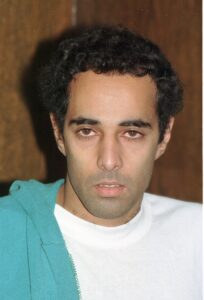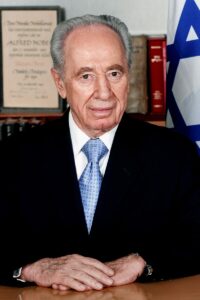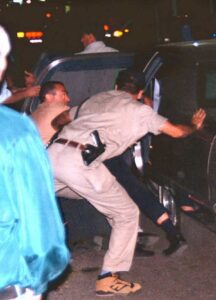
 Israeli Prime Minister Yitzhak Rabin was fatally shot after attending a peace rally in Tel Aviv’s Kings Square, Israel on November 4, 1995. He succumbed to his injuries during surgery at Ichilov Hospital in Tel Aviv. The assassination occurred as Rabin was leaving the rally. The killer was Yigal Amir, who was against the Oslo Accords. The rally, held at Kings of Israel Square (now Rabin Square), supported the peace agreement. As Rabin descended the city hall steps towards his car, Amir fired three shots with a semi-automatic pistol. Two bullets struck Rabin, while the third slightly wounded Yoram Rubin, Rabin’s bodyguard. Rabin was rushed to Ichilov Hospital but passed away curing surgery, due to blood loss and lung damage.
Israeli Prime Minister Yitzhak Rabin was fatally shot after attending a peace rally in Tel Aviv’s Kings Square, Israel on November 4, 1995. He succumbed to his injuries during surgery at Ichilov Hospital in Tel Aviv. The assassination occurred as Rabin was leaving the rally. The killer was Yigal Amir, who was against the Oslo Accords. The rally, held at Kings of Israel Square (now Rabin Square), supported the peace agreement. As Rabin descended the city hall steps towards his car, Amir fired three shots with a semi-automatic pistol. Two bullets struck Rabin, while the third slightly wounded Yoram Rubin, Rabin’s bodyguard. Rabin was rushed to Ichilov Hospital but passed away curing surgery, due to blood loss and lung damage.
Yigal Amir, a 27-year-old Jewish law student, was linked to the far-right Jewish group Eyal. He was arrested by Israeli police at the scene of the shooting and subsequently confessed to the assassination. During his arraignment, he explained that he killed Prime Minister Rabin because the prime minister wanted “to give our country to the Arabs.” Amir was apprehended on the spot and later sentenced to life in prison.
Yitzhak Rabin, who was born in Jerusalem, played a pivotal role in the Arab-Israeli War of 1948 and was the chief-of-staff for Israel’s armed forces during the Six-Day War in 1967. Following his tenure as Israel’s ambassador to the United States, he joined the Labour Party and was elected prime minister in 1974. During his term, he led negotiations resulting in the 1974 ceasefire with Syria and the 1975 military disengagement agreement with Egypt. Rabin resigned from his position in 1977 due to a scandal related to maintaining bank 
 accounts in the United States, contrary to Israeli law. He later served as the defense minister of his country from 1984 to 1990.
accounts in the United States, contrary to Israeli law. He later served as the defense minister of his country from 1984 to 1990.
Then, in 1992, Rabin was the leader of the Labour Party, taking them to an electoral victory. Once again, he became the Prime Minister of Israel. The following year, he signed the landmark Israeli-Palestinian Declaration of Principles alongside Palestinian leader Yasser Arafat, and in 1994, they reached a formal peace agreement. In October of that year, Rabin, Arafat, and Israeli Foreign Minister Shimon Peres were jointly awarded the Nobel Peace Prize. Tragically, Rabin was assassinated in 1995. Shimon Peres, who was serving as Israel’s Foreign Minister at the time, was appointed Acting Prime Minister after an emergency cabinet meeting. It was such an unnecessary attack.


One Response to The Death Of Yitzhak Rabin